美国的太平洋世纪 America's Pacific Century
- 格式:doc
- 大小:121.00 KB
- 文档页数:12
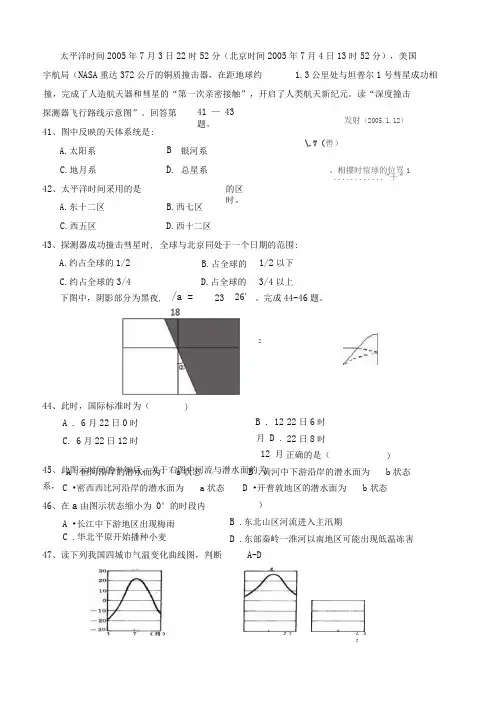
太平洋时间2005年7月3日22时52分(北京时间2005年7月4日13时52分),美国 宇航局(NASA 重达372公斤的铜质撞击器,在距地球约 1.3公里处与坦普尔1号彗星成功相 撞,完成了人造航天器和彗星的“第一次亲密接触”,开启了人类航天新纪元。
读“深度撞击 探测器飞行路线示意图”。
回答第 41 — 43 题。
41、图中反映的天体系统是: A.太阳系 B . 银河系 C.地月系 D. 总星系 42、太平洋时间采用的是 的区时。
A.东十二区 B.西七区发射(2005.1.12) \.7(辔) 、相摟时愷球的位骂1 ............ "十” C.西五区 D.西十二区 43、探测器成功撞击彗星时, 全球与北京同处于一个日期的范围: A.约占全球的1/2 B.占全球的 1/2以下 C.约占全球的3/4 下图中,阴影部分为黑夜, D.占全球的 23 26' 3/4以上。
完成44-46题。
180) /a = 2 44、此时,国际标准时为( A . 6月22日0时C . 6月22日12时 B . 12 月D . 12 月 45、此图示时间的半年后,关于右图中河流与潜水面的关系, 22日6时 22日8时 正确的是( A .恒河沿岸的潜水面为 b 状态 B .黄河中下游沿岸的潜水面为 )b 状态 C •密西西比河沿岸的潜水面为 a 状态 D •开普敦地区的潜水面为 b 状态46、在a 由图示状态缩小为 0°的时段内A •长江中下游地区出现梅雨 C .华北平原开始播种小麦 )B .东北山区河流进入主汛期 D .东部秦岭一淮河以南地区可能出现低温冻害 47、读下列我国四城市气温变化曲线图,判断 A-D 5 t Cc. nt1、49、关于地形对我国地理环境人类活动的影响,叙述正确的是A •我国山区面积广大为林业、牧业、旅游业、种植业、采矿业的发展提供了有利条件B •地势阶梯分界附近,河流水位落差大,水能资源丰富C •地势西高东低,有利于沿海水汽进入内陆,在中西部形成丰富的降水D .地形复杂多样,有利于多种粮食作物的生产,有利于解决人们温饱问题50、关于我国气候对农业生产的影响不正确的是( )A 、夏季雨热同期,对农作物、森林、牧草的生长都十分有利B 、气候复杂多样,世界上大多数农作物和动植物都能在我国找到合适生长的地方C 、我国长江以南地区成为降水丰沛的 鱼米”之乡,主要是受惠于雨热同期的季风气候D 、我国降水季节变化和年际变化大可保证农作物的收成 51、在埃及的尼罗河沿岸平原和入海口处的三角洲种植着大面积的长绒棉,并成为埃及著名的出口商品。
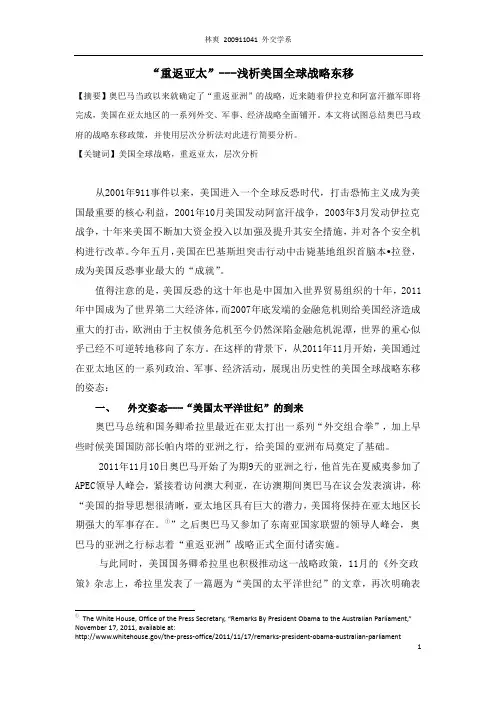
“重返亚太”---浅析美国全球战略东移【摘要】奥巴马当政以来就确定了“重返亚洲”的战略,近来随着伊拉克和阿富汗撤军即将完成,美国在亚太地区的一系列外交、军事、经济战略全面铺开。
本文将试图总结奥巴马政府的战略东移政策,并使用层次分析法对此进行简要分析。
【关键词】美国全球战略,重返亚太,层次分析从2001年911事件以来,美国进入一个全球反恐时代,打击恐怖主义成为美国最重要的核心利益,2001年10月美国发动阿富汗战争,2003年3月发动伊拉克战争,十年来美国不断加大资金投入以加强及提升其安全措施,并对各个安全机构进行改革。
今年五月,美国在巴基斯坦突击行动中击毙基地组织首脑本•拉登,成为美国反恐事业最大的“成就”。
值得注意的是,美国反恐的这十年也是中国加入世界贸易组织的十年,2011年中国成为了世界第二大经济体,而2007年底发端的金融危机则给美国经济造成重大的打击,欧洲由于主权债务危机至今仍然深陷金融危机泥潭,世界的重心似乎已经不可逆转地移向了东方。
在这样的背景下,从2011年11月开始,美国通过在亚太地区的一系列政治、军事、经济活动,展现出历史性的美国全球战略东移的姿态:一、外交姿态---“美国太平洋世纪”的到来奥巴马总统和国务卿希拉里最近在亚太打出一系列“外交组合拳”,加上早些时候美国国防部长帕内塔的亚洲之行,给美国的亚洲布局奠定了基础。
2011年11月10日奥巴马开始了为期9天的亚洲之行,他首先在夏威夷参加了APEC领导人峰会,紧接着访问澳大利亚,在访澳期间奥巴马在议会发表演讲,称“美国的指导思想很清晰,亚太地区具有巨大的潜力,美国将保持在亚太地区长期强大的军事存在。
①”之后奥巴马又参加了东南亚国家联盟的领导人峰会,奥巴马的亚洲之行标志着“重返亚洲”战略正式全面付诸实施。
与此同时,美国国务卿希拉里也积极推动这一战略政策,11月的《外交政策》杂志上,希拉里发表了一篇题为“美国的太平洋世纪”的文章,再次明确表①The White House, Office of the Press Secretary, “Remarks By President Obama to the Australian Parliament,”November 17, 2011, available at:/the-press-office/2011/11/17/remarks-president-obama-australian-parliament示“美国未来的政策决定于亚洲而不是阿富汗或者伊拉克,而美国将会站在此行动的中心①”。
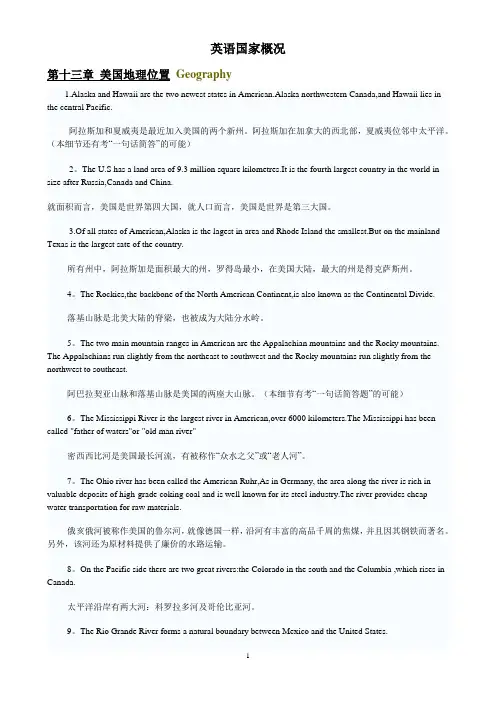
英语国家概况第十三章美国地理位置Geography1.Alaska and Hawaii are the two newest states in American.Alaska northwestern Canada,and Hawaii lies in the central Pacific.阿拉斯加和夏威夷是最近加入美国的两个新州。
阿拉斯加在加拿大的西北部,夏威夷位邻中太平洋。
(本细节还有考“一句话简答”的可能)2。
The U.S has a land area of 9.3 million square kilometres.It is the fourth largest country in the world in size after Russia,Canada and China.就面积而言,美国是世界第四大国,就人口而言,美国是世界是第三大国。
3.Of all states of American,Alaska is the lagest in area and Rhode Island the smallest.But on the mainland Texas is the largest sate of the country.所有州中,阿拉斯加是面积最大的州,罗得岛最小,在美国大陆,最大的州是得克萨斯州。
4。
The Rockies,the backbone of the North American Continent,is also known as the Continental Divide.落基山脉是北美大陆的脊梁,也被成为大陆分水岭。
5。
The two main mountain ranges in American are the Appalachian mountains and the Rocky mountains. The Appalachians run slightly from the northeast to southwest and the Rocky mountains run slightly from the northwest to southeast.阿巴拉契亚山脉和落基山脉是美国的两座大山脉。
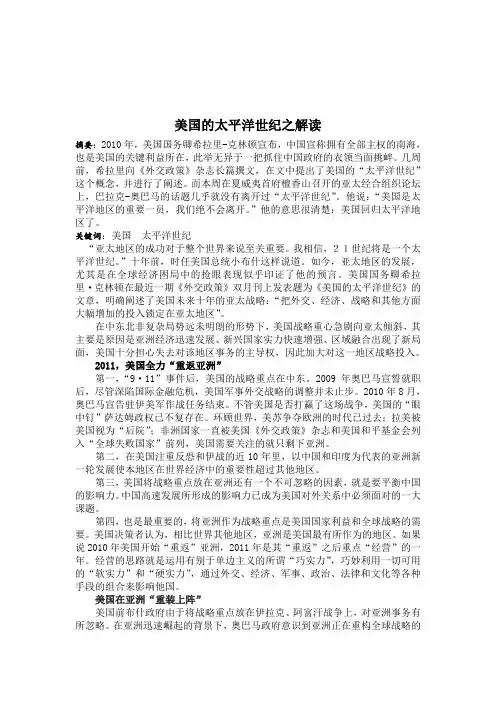
美国的太平洋世纪之解读摘要:2010年,美国国务卿希拉里-克林顿宣布,中国宣称拥有全部主权的南海,也是美国的关键利益所在,此举无异于一把抓住中国政府的衣领当面挑衅。
几周前,希拉里向《外交政策》杂志长篇撰文,在文中提出了美国的“太平洋世纪”这个概念,并进行了阐述。
而本周在夏威夷首府檀香山召开的亚太经合组织论坛上,巴拉克-奥巴马的话题几乎就没有离开过“太平洋世纪”。
他说:“美国是太平洋地区的重要一员,我们绝不会离开。
”他的意思很清楚:美国回归太平洋地区了。
关键词:美国太平洋世纪“亚太地区的成功对于整个世界来说至关重要。
我相信,21世纪将是一个太平洋世纪。
”十年前,时任美国总统小布什这样说道。
如今,亚太地区的发展,尤其是在全球经济困局中的抢眼表现似乎印证了他的预言。
美国国务卿希拉里·克林顿在最近一期《外交政策》双月刊上发表题为《美国的太平洋世纪》的文章,明确阐述了美国未来十年的亚太战略:“把外交、经济、战略和其他方面大幅增加的投入锁定在亚太地区”。
在中东北非复杂局势远未明朗的形势下,美国战略重心急剧向亚太倾斜,其主要是原因是亚洲经济迅速发展、新兴国家实力快速增强、区域融合出现了新局面,美国十分担心失去对该地区事务的主导权,因此加大对这一地区战略投入。
2011,美国全力“重返亚洲”第一,“9·11”事件后,美国的战略重点在中东。
2009年奥巴马宣誓就职后,尽管深陷国际金融危机,美国军事外交战略的调整并未止步。
2010年8月,奥巴马宣告驻伊美军作战任务结束。
不管美国是否打赢了这场战争,美国的“眼中钉”萨达姆政权已不复存在。
环顾世界,美苏争夺欧洲的时代已过去;拉美被美国视为“后院”;非洲国家一直被美国《外交政策》杂志和美国和平基金会列入“全球失败国家”前列,美国需要关注的就只剩下亚洲。
第二,在美国注重反恐和伊战的近10年里,以中国和印度为代表的亚洲新一轮发展使本地区在世界经济中的重要性超过其他地区。
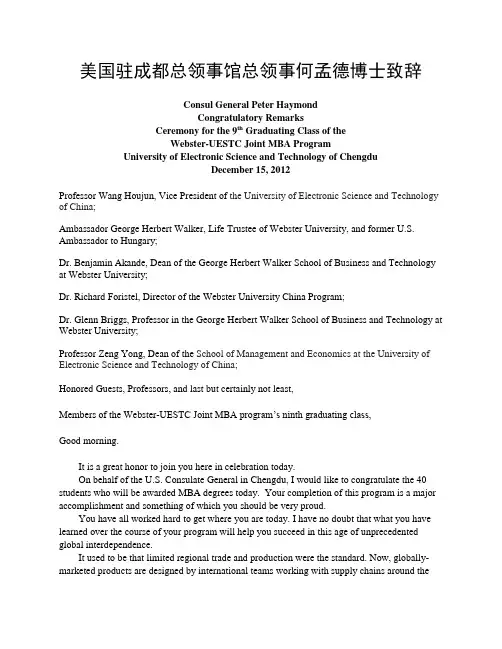
美国驻成都总领事馆总领事何孟德博士致辞Consul General Peter HaymondCongratulatory RemarksCeremony for the 9th Graduating Class of theWebster-UESTC Joint MBA ProgramUniversity of Electronic Science and Technology of ChengduDecember 15, 2012Professor Wang Houjun, Vice President of the University of Electronic Science and Technology of China;Ambassador George Herbert Walker, Life Trustee of Webster University, and former U.S. Ambassador to Hungary;Dr. Benjamin Akande, Dean of the George Herbert Walker School of Business and Technology at Webster University;Dr. Richard Foristel, Director of the Webster University China Program;Dr. Glenn Briggs, Professor in the George Herbert Walker School of Business and Technology at Webster University;Professor Zeng Yong, Dean of the School of Management and Economics at the University of Electronic Science and Technology of China;Honored Guests, Professors, and last but certainly not least,Members of the Webster-UESTC Joint MBA program’s ninth graduating class,Good morning.It is a great honor to join you here in celebration today.On behalf of the U.S. Consulate General in Chengdu, I would like to congratulate the 40 students who will be awarded MBA degrees today. Your completion of this program is a major accomplishment and something of which you should be very proud.You have all worked hard to get where you are today. I have no doubt that what you have learned over the course of your program will help you succeed in this age of unprecedented global interdependence.It used to be that limited regional trade and production were the standard. Now, globally-marketed products are designed by international teams working with supply chains around theworld. Information travels between countries almost instantaneously, reaching millions of people in a matter of seconds. At no point in history have we been so interlinked.This global environment presents us with new opportunities. It also presents us with new challenges, which in turn require us to develop new ways of thinking. You, in particular, are going to bring to these challenges the unique and important perspectives you have gained from your international degree program. Your program has helped you develop into future business leaders of a global economy, leaders who will excel thanks not only to your business skills, but also thanks to your language skills and your understanding of other cultures.Secretary of State Hillary Clinton calls this the “Pacific Century.” The U.S. – China relationship will play a crucial role throughout this century. As Consul General, my mission is to help expand and strengthen the U.S.-China relationship in the rapidly developing region of southwest China, one of the most dynamic, economically-thriving, and culturally-rich places in which I have been privileged to serve.In order to expand and strengthen this relationship, we at the Consulate believe it is essential to increase mutual understanding between our nations. We do this in many ways, including promoting educational and cultural exchanges, encouraging cooperation between U.S. and Chinese businesses, and promoting trade and investment in both directions. Growing two-way trade and investment relations, in particular, will give each of our countries a major stake in the economic success of the other.Academic programs like yours are a wonderful testament to the value of these exchange efforts. Through its innovative, internationalized approach to education, the Webster-UESTC Joint MBA program brings together students and faculty from the United States and China to prepare a corps of future leaders poised to increase mutual understanding and contribute to an increasingly global economy.Whether you are a graduate of the Joint MBA program or one of the business and educational leaders who have worked tirelessly to develop this program over the past ten years, you are playing a major role in ensuring the prosperity of our two great nations. In the future I look forward to learning about the great discoveries and breakthroughs you have achieved.I wish all of you great success moving forward. I know that your studies here, your deep knowledge of the United States and China, and your expertise working in a multicultural environment will be resources you draw on daily to help drive your future successes.Best wishes to you all, and again, congratulations!尊敬的电子科技大学王厚军副校长尊敬的韦伯斯特大学终身董事,前美国驻匈牙利大使乔治·沃克博士尊敬的韦伯斯特大学乔治·赫伯特·沃克商学院本杰明·阿坎德院长尊敬的韦伯斯特大学中方项目主任理查德·福斯特博士尊敬的的韦伯斯特大学乔治·赫伯特·沃克商学院格林·布瑞格教授尊敬的电子科技大学经济与管理学院院长曾勇教授尊敬的各位来宾,教授,以及第九届电子科技大学与韦伯斯特大学合作工商管理硕士项目的全体毕业生们:上午好!今天,本人非常荣幸能在此庆祝各位毕业。
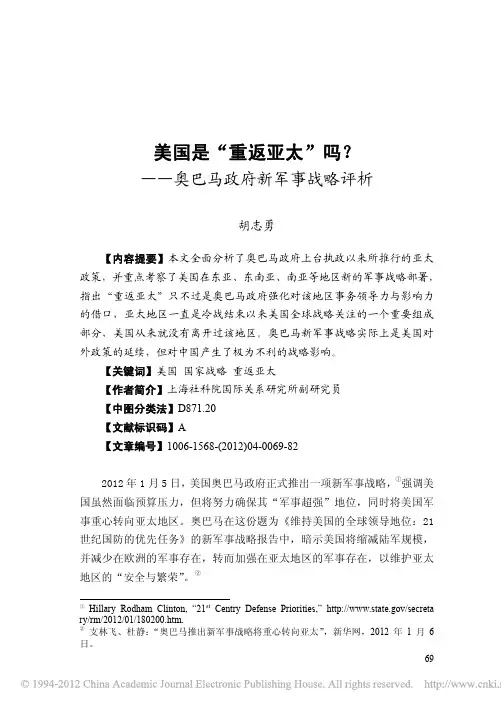
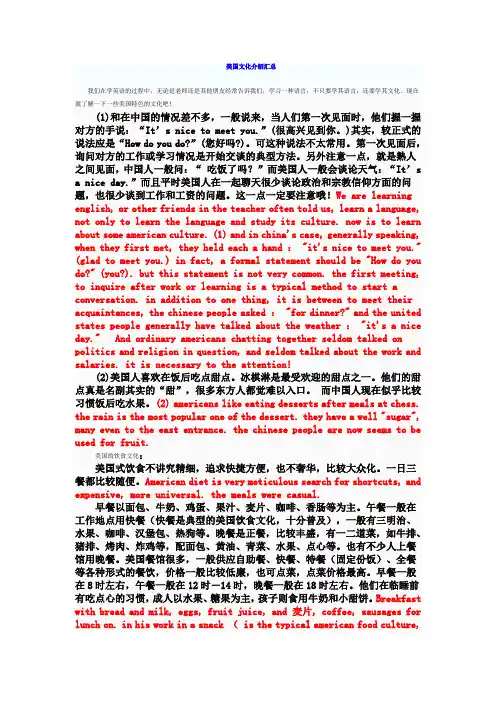
美国文化介绍汇总我们在学英语的过程中,无论是老师还是其他朋友经常告诉我们,学习一种语言,不只要学其语言,还要学其文化。
现在就了解一下一些美国特色的文化吧!(1)和在中国的情况差不多,一般说来,当人们第一次见面时,他们握一握对方的手说:“It’s nice to meet you.”(很高兴见到你。
)其实,较正式的说法应是“How do you do?”(您好吗?)。
可这种说法不太常用。
第一次见面后,询问对方的工作或学习情况是开始交谈的典型方法。
另外注意一点,就是熟人之间见面,中国人一般问:“ 吃饭了吗?”而美国人一般会谈论天气:“It’s a nice day.”而且平时美国人在一起聊天很少谈论政治和宗教信仰方面的问题,也很少谈到工作和工资的问题。
这一点一定要注意哦!We are learning english, or other friends in the teacher often told us, learn a language, not only to learn the language and study its culture. now is to learn about some american culture. (1) and in china's case, generally speaking, when they first met, they held each a hand : "it's nice to meet you." (glad to meet you.) in fact, a formal statement should be "How do you do?" (you?). but this statement is not very common. the first meeting, to inquire after work or learning is a typical method to start a conversation. in addition to one thing, it is between to meet their acquaintances, the chinese people asked : "for dinner?" and the united states people generally have talked about the weather : "it's a nice day." And ordinary americans chatting together seldom talked on politics and religion in question, and seldom talked about the work and salaries. it is necessary to the attention!(2)美国人喜欢在饭后吃点甜点。
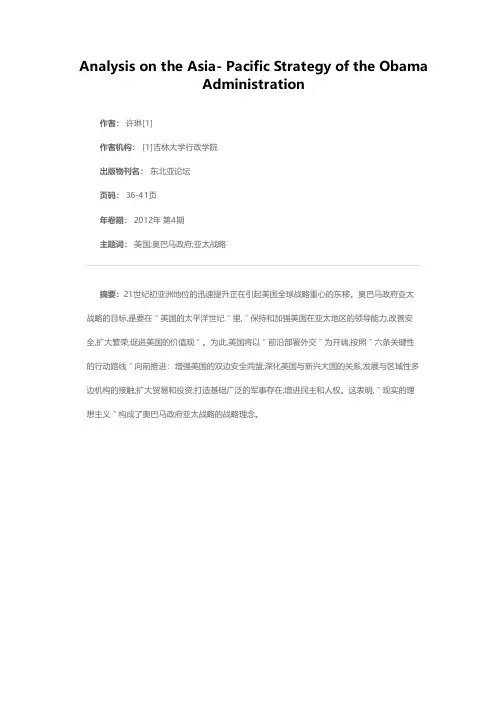
Analysis on the Asia- Pacific Strategy of the Obama
Administration
作者: 许琳[1]
作者机构: [1]吉林大学行政学院
出版物刊名: 东北亚论坛
页码: 36-41页
年卷期: 2012年 第4期
主题词: 美国;奥巴马政府;亚太战略
摘要:21世纪初亚洲地位的迅速提升正在引起美国全球战略重心的东移。
奥巴马政府亚太
战略的目标,是要在"美国的太平洋世纪"里,"保持和加强美国在亚太地区的领导能力,改善安全,扩大繁荣,促进美国的价值观"。
为此,美国将以"前沿部署外交"为开端,按照"六条关键性
的行动路线"向前推进:增强美国的双边安全同盟;深化美国与新兴大国的关系;发展与区域性多边机构的接触;扩大贸易和投资;打造基础广泛的军事存在;增进民主和人权。
这表明,"现实的理
想主义"构成了奥巴马政府亚太战略的战略理念。
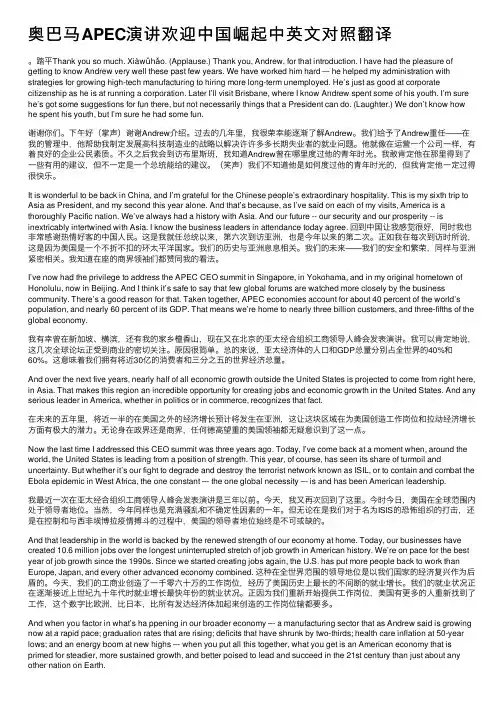
奥巴马APEC演讲欢迎中国崛起中英⽂对照翻译。
踏平Thank you so much. Xiàwǔhǎo. (Applause.) Thank you, Andrew, for that introduction. I have had the pleasure of getting to know Andrew very well these past few years. We have worked him hard –- he helped my administration with strategies for growing high-tech manufacturing to hiring more long-term unemployed. He’s just as good at corporate citizenship as he is at running a corporation. Later I’ll visit Brisbane, where I know Andrew spent some of his youth. I’m sure he’s got some suggestions for fun there, but not necessarily things that a President can do. (Laughter.) We don’t know how he spent his youth, but I’m sure he had some fun.谢谢你们。
下午好(掌声)谢谢Andrew介绍。
过去的⼏年⾥,我很荣幸能逐渐了解Andrew。
我们给予了Andrew重任——在我的管理中,他帮助我制定发展⾼科技制造业的战略以解决许许多多长期失业者的就业问题。
他就像在运营⼀个公司⼀样,有着良好的企业公民素质。
不久之后我会到访布⾥斯班,我知道Andrew曾在哪⾥度过他的青年时光。
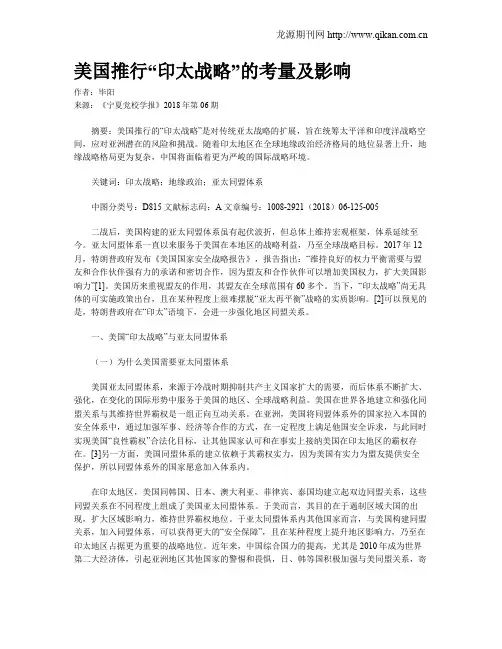
美国推行“印太战略”的考量及影响作者:毕阳来源:《宁夏党校学报》2018年第06期摘要:美国推行的“印太战略”是对传统亚太战略的扩展,旨在统筹太平洋和印度洋战略空间,应对亚洲潜在的风险和挑战。
随着印太地区在全球地缘政治经济格局的地位显著上升,地缘战略格局更为复杂,中国将面临着更为严峻的国际战略环境。
关键词:印太战略;地缘政治;亚太同盟体系中图分类号:D815 文献标志码:A 文章编号:1008-2921(2018)06-125-005二战后,美国构建的亚太同盟体系虽有起伏波折,但总体上维持宏观框架,体系延续至今。
亚太同盟体系一直以来服务于美国在本地区的战略利益,乃至全球战略目标。
2017年12月,特朗普政府发布《美国国家安全战略报告》,报告指出:“维持良好的权力平衡需要与盟友和合作伙伴强有力的承诺和密切合作,因为盟友和合作伙伴可以增加美国权力,扩大美国影响力”[1]。
美国历来重视盟友的作用,其盟友在全球范围有60多个。
当下,“印太战略”尚无具体的可实施政策出台,且在某种程度上很难摆脱“亚太再平衡”战略的实质影响。
[2]可以预见的是,特朗普政府在“印太”语境下,会进一步强化地区同盟关系。
一、美国“印太战略”与亚太同盟体系(一)为什么美国需要亚太同盟体系美国亚太同盟体系,来源于冷战时期抑制共产主义国家扩大的需要,而后体系不断扩大、强化,在变化的国际形势中服务于美国的地区、全球战略利益。
美国在世界各地建立和强化同盟关系与其维持世界霸权是一组正向互动关系。
在亚洲,美国将同盟体系外的国家拉入本国的安全体系中,通过加强军事、经济等合作的方式,在一定程度上满足他国安全诉求,与此同时实现美国“良性霸权”合法化目标,让其他国家认可和在事实上接纳美国在印太地区的霸权存在。
[3]另一方面,美国同盟体系的建立依赖于其霸权实力,因为美国有实力为盟友提供安全保护,所以同盟体系外的国家愿意加入体系内。
在印太地区,美国同韩国、日本、澳大利亚、菲律宾、泰国均建立起双边同盟关系,这些同盟关系在不同程度上组成了美国亚太同盟体系。

加利福尼亚美国的太平洋之州加利福尼亚:美国的太平洋之州加利福尼亚(California),位于美国西部,是美国最著名的州之一。
拥有丰富的自然资源,悠久的历史以及多样化的文化。
加利福尼亚州自然景观壮丽,太平洋海岸线延绵数千公里,山川起伏,湖泊众多,是一个自然风景独特的州。
同时,加利福尼亚还是美国经济的中心之一,拥有众多的高科技企业和创新产业,被誉为“科技创新的孵化器”。
让我们一起来探索这个美丽的太平洋之州。
一、自然景观加利福尼亚州地理位置优越,拥有多样化的自然景观。
从太平洋沿岸到内陆山脉,从干旱的沙漠到湛蓝的湖泊,每一个地方都展现出自己独有的美景。
1. 太平洋海岸线:加利福尼亚州西临太平洋,拥有令人惊叹的海岸线。
从旧金山的金门大桥到洛杉矶的圣塔莫尼卡海滩,沿途有壮丽的峡湾、迷人的海滩和美丽的海景。
这里是冲浪者和海滩爱好者的天堂。
2. 内陆山脉:加利福尼亚州地势复杂,横跨着科斯塔山脉、塞拉内华达山脉和圣安德烈亚斯断裂,拥有许多令人叹为观止的山脉景观。
比如美洲最高峰之一的惠特尼山,高度达到4418米,吸引了来自世界各地的登山爱好者。
3. 湖泊:加利福尼亚州拥有众多湖泊,其中最著名的是位于东部的塞拉湖和北部的大瀑布湖。
这些湖泊清澈而宁静,周围环绕着壮丽的山脉,成为旅游者和水上运动爱好者的热门去处。
二、历史与文化加利福尼亚州的历史悠久,多元文化交融,形成了独特的社会风貌和文化态度。
1. 印第安人遗迹:在加利福尼亚州的各个角落可以找到许多印第安人的遗迹,这些古老的文化遗产见证了千年文明的发展。
洛杉矶地区的斯泰普尔中心和旧金山的阿尔卡特拉兹岛都是保存完好的印第安人遗址。
2. 旧金山的淘金热:十九世纪中期,加利福尼亚州爆发了一场引起全球关注的淘金热,吸引了大批前来寻找财富的人们。
旧金山成为繁荣的矿镇,至今仍保留着许多当时的古老建筑和历史遗迹。
3. 奥克兰的文化多样性:奥克兰是加利福尼亚州的多元文化中心,拥有来自世界各地的移民和居民。
美国求助编辑百科名片美国国旗美利坚合众国(USA )是一个由五十个州和一个联邦直辖特区组成的宪政联邦共和制国家,东濒大西洋,西临太平洋,北靠加拿大,南接墨西哥。
美国是个多文化和多民族的国家;国土面积超过962万平方公里,位居全球第三或第四;人口总量超过三亿人,居世界第三。
1776年7月4日,大陆会议在费城正式通过《独立宣言》,宣告美国诞生。
自1870年以来美国国民经济就高居全球第一,是联合国安理会五个常任理事国之一,当今的国内生产总值超过全球20%。
其在经济、政治、科技、军事、娱乐等诸多领域的巨大影响力均领衔全球,是目前世界上唯一的超级大国。
中文名称: 美利坚合众国 英文名称: United States of America 简称: 美国、U.S.A. 所属洲: 北美洲 首都: 华盛顿哥伦比亚特区 主要城市: 纽约、旧金山、芝加哥、达拉斯 国庆日: 1776年7月4日 国歌: 《星条旗》 国家代码: USA 官方语言: 英语 货币: 美元 时区: 西五区至西十区 政治体制: 联邦制 国家领袖: 贝拉克·奥巴马、约瑟夫·拜登、约翰·罗伯茨人口数量: 3.0875亿(2010年)人口密度: 33.7人/平方公里(2010年) 主要民族: 美利坚民族、拉丁裔、非裔、亚裔主要宗教: 新教、天主教、摩门教、犹太教国土面积: 9,629,091平方公里 水域率:6.76% GDP 总计: 14.780万亿美元(2010年) 人均GDP : 47,132美元(2010年) 国际电话区号:+1 国际域名缩写:.us 道路通行: 靠右行驶基尼系数: 0.450(2007年)人类发展指数:0.902(极高,2010年) 国家象征: 玫瑰花、蓝宝石、白头海雕美利坚合众国一级行政区划联邦州 ▪ 亚拉巴马州 ▪ 夏威夷州▪ 马萨诸塞州 ▪ 新墨西哥州 ▪ 南达科他州 ▪ 阿拉斯加州 ▪ 爱达荷州▪ 密歇根州 ▪ 纽约州 ▪ 田纳西州 ▪ 亚利桑那州 ▪ 伊利诺伊州 ▪ 明尼苏达州 ▪ 北卡罗来纳州 ▪得克萨斯州 ▪ 阿肯色州▪ 印第安纳州 ▪ 密西西比州 ▪ 北达科他州 ▪ 犹他州▪加利福尼亚州▪艾奥瓦州▪密苏里州▪俄亥俄州▪佛蒙特州▪科罗拉多州▪堪萨斯州▪蒙大拿州▪俄克拉何马州▪弗吉尼亚州▪康涅狄格州▪肯塔基州▪内布拉斯加州▪俄勒冈州▪华盛顿州▪特拉华州▪路易斯安那州▪内华达州▪宾夕法尼亚州▪西弗吉尼亚州▪佛罗里达州▪缅因州▪新罕布什尔州▪罗得岛州▪威斯康星州▪佐治亚州▪马里兰州▪新泽西州▪南卡罗来纳州▪怀俄明州联邦地区▪华盛顿哥伦比亚特区岛屿地区▪美属萨摩亚▪关岛▪北马里亚纳群岛邦▪波多黎各自治邦▪美属维尔京群岛美国本土外小岛屿▪贝克岛▪豪兰岛▪贾维斯岛▪约翰斯顿环礁▪金曼礁▪中途岛▪纳弗沙岛▪巴尔米拉环礁▪威克岛目录简介国名国旗国徽格言国歌首都都市语言独立日国土时区国家象征央行简史1607殖民时期以前1607~1753殖民时期1754~1783独立运动1784~1819新政府成立1820~1849向西扩张1850~1869南北战争1870~1929工业化与改革1930~1945大萧条和第二次世界大战冷战时期恐怖袭击与反恐政策地理位置气候水文生物资源行政区划城市政治宪法国会政府政党外交军事经济财政金融交通运输人民生活人口移民原住民平均年龄姓氏科教文卫教育高等教育科技新闻媒体宗教社会福利医疗卫生中国表现美国的漫画旅游简介国名国旗国徽格言国歌首都都市语言独立日国土时区国家象征央行简史1607殖民时期以前1607~1753殖民时期1754~1783独立运动1784~1819新政府成立1820~1849向西扩张1850~1869南北战争1870~1929工业化与改革1930~1945大萧条和第二次世界大战冷战时期恐怖袭击与反恐政策地理位置气候水文生物资源行政区划城市政治宪法国会政府政党外交军事经济财政金融交通运输人民生活人口移民原住民平均年龄姓氏科教文卫教育高等教育科技新闻媒体宗教社会福利医疗卫生中国表现美国的漫画旅游展开编辑本段简介国名美利坚合众国(United States of America),[1]简称美国(U.S.A),英语亦常称之为United States、U.S、The U.S、USA、The States或者America。
3. 从“门修斯”到“本瑟姆”从“门修斯”到“本瑟姆” 看到“门修斯”三个字,人们就会想到那个由于译者不熟悉约定俗成的“孟子”英译(Mencius)而闹出的笑话:回译中出了错误,“亚圣”孟子被改名为“门修斯”。
无独有偶。
萨缪尔森的《经济学》第16版中译本把英国功利主义哲学家Bentham(边沁)译为“本瑟姆”,把free-rider(免费搭车)译为“自由骑士”。
没见过原文的读者看到这样的译文恐怕会疑窦丛生。
有人就上面第二件事发表意见:“关键术语,并非人所共知的地名、人名、容易引起歧义的词语,译者没有把握的词语和其他专用术语,至少第一次出现时应该附上原文。
”还忍不住评论到:“经济学译著中出现的这类问题实际上反映了时下中国经济学界常被人诟病的硬伤。
”其实,类似的错误何止成百上千?犯错误的又何止是经济学专著的译者?译者要注意的问题其实很简单:第一,知识面尽量宽一些,避免“以己昏昏,使人昭昭”;第二,态度上再谨慎一些,相信自己并非无所不知。
遵循必要的学术或出版规范可以规避许多事后的尴尬。
翻开每天的报纸,在有关国际事务的报道译文中经常会出现前后不一或不知所云的人名、地名和事件名。
有作者将常见的专有名词归纳为五类:人名(例如:Aldous Huxley是英国作家“赫胥黎”,不是“哈克斯利”)地名(例如:韩国首都Seoul的译名已改为:首尔,不再是“汉城”)企业名称(例如:Pacific Century指的是“盈科”公司,不是“太平洋世纪”公司)机构名称(例如:Madame Tussauds蜡像馆是“杜莎夫人蜡像馆”)职务、职称、职业(例如:president在不同场合下应译为“总裁”、“主席”等)除以上五类在经贸领域内常见的专有名词外,频繁出现在翻译材料中的还有各行各业的专业术语。
搞翻译的人,难免不会碰到自己熟知领域以外的,而又无法回避的各类专用术语。
解决的办法只有勤质疑、勤查问与勤核对了。
例如,在一篇涉及雷达原理的文章中出现的fruit一词,自然不是指“水果”或是“成果”,查专业字典得出“同步回波显示”与“异步应答干扰”的释义。
美国[United States]正式名称美利坚合众国。
北美洲联邦共和国。
领土包括美洲大陆中纬度地区48个连成一片的州、北美洲西北端的阿拉斯加州,以及太平洋中部的岛州夏威夷。
面积:(包括五大湖)9,529,063平方千米。
人口:约286,067,000(2001)。
首都:华盛顿特区。
人口包括白人、非洲裔美国人、西班牙裔美国人、亚洲人、太平洋岛民、美洲印第安人(美洲土著)、爱斯基摩人及阿留申人。
语言:英语(主要语言)、西班牙语。
宗教:新教、天主教、犹太教和伊斯兰教。
货币:美元。
地形由山脉、平原、低地和沙漠构成。
山脉包括阿巴拉契亚山脉、欧扎克山、落基山脉、喀斯喀特山脉和内华达山脉。
最低点是加利福尼亚州的死谷。
最高点是阿拉斯加山脉的麦金利山,而在美国本土,最高点则是惠特尼山。
主要河流是密西西比河系、科罗拉多河、哥伦比亚河和格兰德河。
五大湖、大盐湖和奥基乔比湖为几个最大的湖。
美国是世界某些矿产的主要生产国,包括铜、银、锌、金、煤、石油和天然气;也是食品的主要输出国。
制造业包括钢铁产品、化学制品、电子产品和纺织品。
其他重要行业为旅游业、奶制品业、畜牧业、渔业和木材加工业。
美国是两院制共和国。
总统为国家元首和政府首脑。
数千年以前已有一些美洲印第安人定居在这块领土,他们可能是来自亚洲。
16世纪欧洲人来此探险和定居,开始取代印第安人。
第一个欧洲人永久居民点是由西班牙人于1565年在佛罗里达州建立的圣奥古斯丁,后来英国人在弗吉尼亚州詹姆斯敦(1607)、马萨诸塞州普里茅斯(1620)、马里兰州(1634)和宾夕法尼亚州(1681)建立定居点。
在卡罗来纳被授予英国贵族一年后,1664年英国人从荷兰人手中夺走纽约、新泽西和德拉瓦。
英国人于1763年击败法国人(参阅法英北美殖民地争夺战[French and Indian War]),在政治上控制了13个殖民地。
英国殖民政策引起的政治动乱,以美国独立战争(1775~1783)和《独立宣言》(1776)而告结束。
新托福听力必备知识背景- 简明美国历史及重要事件英文表达[b][size=3][size=5][align=center]新托福听力必备知识背景- 简明美国历史及重要事件英文表达[/size][size=4][align=center]英属北美殖民地的建立(1607--1733)[/align][/size]北美洲原始居民为印第安人。
16-18世纪,正在进行资本原始积累的西欧各国相继入侵北美洲。
法国人建立了新法兰西(包括圣劳伦斯流域下游大潮区,密西西比河流域等处);西班牙人建立了新西班牙(包括墨西哥和美国西南部的广大地区)。
1607年,英国建立了第1个殖民据点—詹姆士城,此后在大西洋沿岸陆续建立了13个殖民地。
到达殖民地的大多数是西欧贫苦的劳动人民,也有贵族、地主、资产阶级,以英国人、爱尔兰人、德意志人和荷兰人最多。
移民中有逃避战祸和宗教迫害者,有自愿和非自愿的“契约奴”以及乞丐、罪犯;还有从非洲被贩运来的黑人。
“五月花”号(Mayflower)[align=center][size=4]独立战争(1774—1783)[/size][/align]英法为争夺海上霸权和掠夺殖民地而进行的七年战争,以英国胜利告终。
英国在北美接管了加拿大,控制了密西西比河以东的新法兰西,对北美殖民地全面加强控制,宣告阿巴拉契亚山脉以西为王室产业,禁止殖民地人民染指;并征收重税,严厉缉私,限制经济活动,严重损害了殖民地各阶层人民的经济利益。
从1619年弗吉尼亚建立议会起,各殖民地相继成立议会,与英国相抗衡,1765年9个殖民地举行抗议印花税大会,掀起反抗怒潮。
18世纪70年代英国进一步执行高压政策,1770年波士顿惨案发生。
1773年通过了茶税法,引起波士顿倾茶事件。
1774年颁布了5项不可容忍的法令(诸如封闭波士顿港,增派英国驻军,取消马萨诸塞自治权,确立英国对殖民地的司法权等),从政治上军事上加紧对殖民地的控制与镇压。
美国“重返”亚洲及对中美关系的影响近来,因日本政府演出一场钓鱼岛“购岛”事件,致使日趋紧张的中日关系下降到冰点。
日本政府和国内军国主义势力,公然质疑二战的历史宣判,特别是《开罗宣言》和《波茨坦公告》缺乏国际法效力,激化同邻国的领土争端,公然挑战战后国际秩序的行径。
这自然有其深刻而复杂的国内与国际背景。
仅从国际背景来对此作深层解读与思考,我们认为,这与当前的国际环境,特别是美国“重返”亚洲战略有着内在联系。
当前国际形势可以通过三件大事来展现:欧洲主权债务危机及由此而引发的社会危机、席卷西亚北非的历史性政治大动荡、美国全球战略重心东移。
以上“大危机、大动荡、大转移”事件分别主要发生在经济领域、政治领域和军事领域,都与美国相关,且都与我国的国家安全息息相关,直接影响我国的生存发展。
而三件大事中,美国重返亚洲,即全球战略重心东移是影响包括我们在内的世界各国安全的重要变量。
美国全球战略重心东移,给冷战结束以来当代国际战略格局带来重大冲击,也是最重要的战略结构性调整。
它重塑了国际战略格局,调整了现有国际秩序,给我国的周边安全带来新的考验。
亚太地区是中美利益交汇最直接、最多和利益交错最为复杂的地区,随着近年来该地区经济快速发展及其引起的军事安全方面的变化,中美两国在该地区竞争的一面加强,矛盾和摩擦增多。
如何处理好同美国在亚太地区的利益关系问题伴随着中国崛起的全过程,同时也成为我急需解决的重大外交与安全课题。
视频:希拉里:本世纪是美国的太平洋世纪。
自美国提出“重返亚洲”口号以来,美国利用地区不稳定因素强势介入地区事务,强化同盟关系,拉拢中国周边国家。
由于美国因素的作用,亚太地区部分国家在处理对华关系问题上方式发生改变,甚至与美国里应外合对中国施压,中国周边环境有所恶化。
美国怎样重返亚洲,为什么要重返亚洲,为什么要和中国过不去,美国重返亚洲会产生怎样的影响,我们如何从思路上进行应对,这是我们今天要探讨的问题。
一、美国如何重返亚洲美国通过以下三个方面推动其重返亚洲,实现战略重心东移:第一,宣布战略重心东移。
America’s Pacific Century美国的太平洋世纪Op-Ed by U.S. Secretary of State Hillary Rodham Clinton美国国务卿希拉里·克林顿The future of politics will be decided in Asia, not Afghanistan or Iraq, and the United States will beright at the center of the action.未来的政治将决定于亚洲,而不是阿富汗或伊拉克。
美国将置身于行动的中心。
As the war in Iraq winds down and America begins to withdraw its forces from Afghanistan, theUnited States stands at a pivot point. O ver the last 10 years, we have allocated immense resourcesto those two theaters. In the next 10 years, we need to be smart and systema tic about where weinvest time and energy, so that we put ourselves in the best position to sustain our leadership,secure our interests, a nd advance our values. One of the most important tasks of Americanstatecraft over the next decade will therefore be to lock in a substa ntially increased investment —diplomatic, economic, strategic, and otherwise — in the Asia-Pacific region.随着伊拉克战争接近尾声以及美国开始从阿富汗撤军,美国现在处于一个转折点。
在过去10年中,我们向上述两个战区投入了巨大的资源。
在今后10年中,我们对在哪里投入时间和精力需要做到灵活并有系统性,从而让我们自己处于最有利的地位,以保持我们的领导作用,保障我们的利益,推进我们的价值观。
因此,今后10年美国外交方略的最重要的使命之一将是把大幅增加的投入——在外交、经济、战略和其他方面——锁定于亚太地区。
The Asia-Pacific has become a key driver of global politics. Stretching from the Indian subcontinentto the western shores of the Ameri cas, the region spans two oceans — the Pacific and the Indian— that are increasingly linked by shipping and strategy. It boasts almost half the world’spopulation. It includes many of the key engines of the global economy, as well as the largestemitters of greenhouse gas es. It is home to several of our key allies and important emergingpowers like China, India, and Indonesia.亚太地区已成为全球政治的一个关键的驱动力。
这个地区从印度次大陆一直延伸到美洲西海岸,横跨太平洋和印度洋两个大洋,由于交通运输和战略因素而日益紧密地联系在一起。
亚太地区的人口几乎占到世界总人口的一半。
这个地区拥有很多全球经济的重要引擎,也有最大的温室气体排放国。
该地区有我们的一些重要盟国,还有中国、印度和印度尼西亚等重要的新兴强国。
At a time when the region is building a more mature security and economic architecture topromote stability and prosperity, U.S. com mitment there is essential. It will help build thatarchitecture and pay dividends for continued American leadership well into this centu ry, just as ourpost-World War II commitment to building a comprehensive and lasting transatlantic network ofinstitutions and relatio nships has paid off many times over — and continues to do so. The time hascome for the United States to make similar investments as a Pacific power, a strategic course setby President Barack Obama from the outset of his administration and one that is already yielding benefits.在亚太地区建设一个更成熟的安全和经济架构以增进稳定和繁荣之时,美国对这个地区的承诺至关重要。
这将有助于建立起上述架构,同时使美国受益,让我们在整个世纪继续发挥领导作用,正如我国在二战过后致力于建立一个全面、持久的跨大西洋的机构和关系网络的努力已获得多倍收益,而且我们还在继续受益。
现在正是美国作为一个太平洋大国作出同样投入的时候,这条战略路线是巴拉克·奥巴马总统在本届政府就任之初便确定的,现在已经产生效益。
With Iraq and Afghanistan still in transition and serious economic challenges in our own country,there are those on the American poli tical scene who are calling for us not to reposition, but tocome home. They seek a downsizing of our foreign engagement in favor of our pressing domesticpriorities. These impulses are understandable, but they are misguided. Those who say that we canno longer afford t o engage with the world have it exactly backward — we cannot afford not to.From opening new markets for American businesses to cur bing nuclear proliferation to keeping thesea lanes free for commerce and navigation, our work abroad holds the key to our prosperity a ndsecurity at home. For more than six decades, the United States has resisted the gravitational pull ofthese “come home” debates and t he implicit zero-sum logic of these arguments. We must do soagain.由于伊拉克和阿富汗仍处于过渡时期,我们本国也面临着严重的经济挑战,美国政坛上有些人叫我们不要重新定位,而是掉头回家。
他们寻求减少我们的国外参与,主张优先解决紧迫的国内问题。
这些冲动是可以理解的,但也是受到误导的。
那些说我们不能再继续参与全球事务的人完全是本末倒置——不参与的后果远非我们所能承受。
从为美国企业打开新市场到遏制核扩散,再到保持商务和航运的自由通行,我们在国外的工作正是我们国内繁荣和安全的关键所在。
60多年来,美国顶住了此类“回家”论调的牵引力和这些论点所隐含的零和逻辑。
我们必须再次这样做。
Beyond our borders, people are also wondering about America’s intentions — our willingness toremain engaged and to lead. In Asia, th ey ask whether we are really there to stay, whether we arelikely to be distracted again by events elsewhere, whether we can make — an d keep — credibleeconomic and strategic commitments, and whether we can back those commitments with action.The answer is: We c an, and we will.在我们的边界之外,人们也在揣测美国的意图,不知道我们是否愿意继续参与并发挥领导作用。
在亚洲,他们问我们是否真的会长期驻留,我们是否有可能再次因别处发生的事件而转移注意力,我们是否能够作出——并保持——可信的经济和战略承诺,以及我们是否能够以行动来落实这些承诺。
答案是:我们能够而且一定会这样做。
Harnessing Asia’s growth and dynamism is central to American economic and strategic interestsand a key priority for President Obam a. Open markets in Asia provide the United States withunprecedented opportunities for investment, trade, and access to cutting-edge t echnology. Oureconomic recovery at home will depend on exports and the ability of American firms to tap intothe vast and growing co nsumer base of Asia. Strategically, maintaining peace and security acrossthe Asia-Pacific is increasingly crucial to global progress, whe ther through defending freedom ofnavigation in the South China Sea, countering the proliferation efforts of North Korea, or ensuringtr ansparency in the military activities of the region’s key players.利用亚洲的增长和活力是美国的经济和战略利益的核心,也是奥巴马总统确定的一项首要任务。